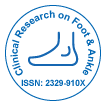Self-Care Assessment in Diabetic Foot Ulcer
Received: 01-Jan-2024 / Editor assigned: 04-Jan-2024 / Reviewed: 22-Jan-2024 / Revised: 24-Jan-2024 / Accepted Date: 30-Jan-2024 / Published Date: 30-Dec-2023
Abstract
Diabetic Foot Ulcers (DFUs) pose a significant health challenge for individuals with diabetes, often leading to severe complications, including infections and amputations. Self-care practices play a crucial role in the prevention and management of DFUs, emphasizing the need for comprehensive and patient-centered approaches to diabetes care. This abstract explores the importance of self-care in the context of diabetic foot ulceration, highlighting key strategies that empower individuals to take an active role in their own health.
Keywords
Diabetic foot ulcers; Diabetes; Diabetes care; Foot ulceration; Patient centered approaches
Introduction
Diabetic Foot Ulcers (DFUs) represent a serious and common complication for individuals living with diabetes, imposing significant health risks and challenges. With the global prevalence of diabetes on the rise, the incidence of DFUs is likewise escalating, emphasizing the critical need for effective management strategies. In this context, the concept of self-care has emerged as an essential and empowering approach to address the prevention, early detection, and overall management of diabetic foot complications. Individuals with diabetes face a heightened risk of developing foot ulcers due to factors such as peripheral neuropathy, impaired circulation, and compromised immune function. These ulcers, if left unattended, can progress to severe infections and, in extreme cases, may necessitate amputations. Recognizing the pivotal role that patients themselves can play in the management of their foot health, self-care practices have become integral to holistic diabetes care [1,2].
Description
The self-care journey begins with education and awareness, ensuring that individuals with diabetes understand the risk factors associated with DFUs and the importance of preventive measures [3]. This includes regular foot inspections, maintaining optimal blood glucose levels, and adopting a healthy lifestyle. Early detection of potential issues is critical, as timely intervention can prevent the progression of minor wounds into more severe ulcers [4, 5]. A multifaceted selfcare approach involves proper foot hygiene, including daily washing, drying, and moisturizing to prevent dry skin and cracks that may lead to ulcers. The use of appropriate footwear is also emphasized, with a focus on well-fitting shoes that reduce pressure points and friction. Regular podiatric care and nail maintenance are integral components of selfcare, ensuring that foot health is monitored and any abnormalities are promptly addressed [6].
Nutritional considerations are essential in self-care for DFUs, as a well-balanced diet supports overall health and wound healing. Adequate intake of vitamins and minerals, particularly vitamin C and zinc, is crucial for the body's natural healing processes. Smoking cessation is strongly recommended, as tobacco use significantly impairs circulation and delays wound healing [7,8].
Emphasizing the psychosocial aspects of self-care, this abstract highlights the importance of mental health support for individuals managing DFUs. Stress management and coping strategies contribute to overall well-being and may positively impact glycemic control, reducing the risk of complications. As we delve into the multifaceted dimensions of self-care for DFUs, it becomes evident that empowering individuals to take charge of their foot health goes beyond the routine management of diabetes [9]. It involves a comprehensive understanding of risk factors, adopting preventive measures, and actively engaging in practices that enhance overall foot well-being. From daily foot inspections to proper footwear selection, nutritional considerations, and psychosocial support, self-care emerges as a dynamic and patientcentric approach to managing diabetic foot complications [10].
Conclusion
In conclusion, a comprehensive self-care approach is indispensable for individuals with diabetic foot ulcers. By promoting awareness, education, and proactive measures, healthcare providers can empower patients to actively participate in their own care, ultimately improving outcomes and enhancing their quality of life. Integrating self-care practices into the broader framework of diabetes management is crucial for addressing the complex challenges posed by DFUs and promoting holistic patient well-being.
References
- Tu P, Bytomski JR (2011) Diagnosis of heel pain. Am Fam Physician. 84: 909-916.
- Papaliodis DN, Vanushkina MA, Richardson NG, DiPreta JA (2014) The foot and ankle examination. Med Clin North Am.98: 181-204.
- Radwan A, Wyland M, Applequist L, Bolowsky E, Klingensmith H, et al. (2016) Ultrasonography, an effective tool in diagnosing plantar fasciitis: a systematic review of diagnostic trials. Int J Sports Phys Ther.
11: 663-671. - Tahririan MA, Motififard M, Tahmasebi MN, Siavashi B (2012) Plantar fasciitis. J Res Med Sci. 17: 799-804.
- Goff JD, Crawford R (2011) Diagnosis and treatment of plantar fasciitis. Am Fam Physician. 84: 676-682.
- Landorf KB (2015) Plantar heel pain and plantar fasciitis. BMJ Clin Evid. 15: 12-26.
- Lewis RD, Wright P, McCarthy LH (2015) Orthotics compared to conventional therapy and other non-surgical treatments for plantar fasciitis. J Okla State Med Assoc. 108: 596-598.
- Chen CM, Chen JS, Tsai WC, Hsu HC, Chen KH, et al. (2013) Effectiveness of device-assisted ultrasound-guided steroid injection for treating plantar fasciitis. Am J Phys Med Rehabi. 92: 597-605.
- Hsiao MY, Hung CY, Chang KV, Chien KL, Tu YK, et al. (2015) Comparative effectiveness of autologous blood-derived products, shock-wave therapy and corticosteroids for treatment of plantar fasciitis: a network meta-analysis. Rheumatology (Oxford). 54: 1735-1743.
- Karls SL, Snyder KR, Neibert PJ (2016) Effectiveness of corticosteroid inject tions in the treatment of plantar fasciitis. J Sport Rehabil. 25: 202-207.
Indexed at, Google Scholar, Crossref
Indexed at, Google Scholar, Crossref
Indexed at, Google Scholar, Crossref
Citation: Zhang L (2024) Self-Care Assessment in Diabetic Foot Ulcer. Clin ResFoot Ankle, 12: 491.
Copyright: © 2024 Zhang L. This is an open-access article distributed under the terms of the Creative Commons Attribution License, which permits unrestricted use, distribution, and reproduction in any medium, provided the original author and source are credited
Share This Article
Recommended Journals
Open Access Journals
Article Usage
- Total views: 707
- [From(publication date): 0-2024 - Apr 07, 2025]
- Breakdown by view type
- HTML page views: 519
- PDF downloads: 188
